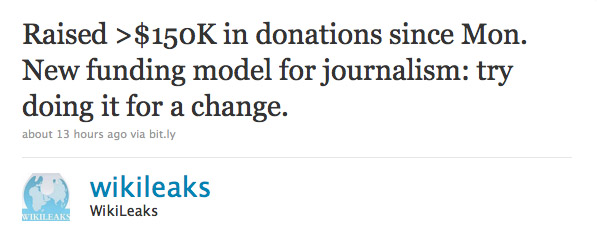Whistleblowing website Wikileaks has received more than £150,000 in donations since Monday, when it published a leaked US military video of the killing of 12 civilians – including two Reuters staff – in Iraq in 2007. According to the Wikileaks site, the project requires $600,000 a year to run.
The video has been hailed as a turning point for the controversial site (see this Wired article from 2009), which uses a network of volunteers to release information and promises full confidentiality for its sources.
As the Editors Weblog summarises:
Many news outlets might find themselves in a love-hate relationship with the news outlet. Wikileaks is situated at an important spot within the news industry as the only place willing to publish stories others can’t or wont. The website can function as a voice capable of breaking high profile scandals news outlets don’t want to break.
While Wikileaks acts as an important watchdog against corruption, the sometimes-paranoid tone of the site might undermine the website’s value while making it a target for criticism. To an extent, Wikileaks has every right to indulge in their paranoia. Several democratic governments around the world, all of whom have laws protecting free speech, have passed or discussed creating new laws which block the public’s access to the website. Just last night, the UK passed the digital economy bill, which contains a clause that could be used to justify blocking Wikileaks. The site is also blacklisted in Denmark and Australia.
Democracy Now is claiming videos it has obtained feature eyewitness accounts of the 2007 attack from the day after event; while international media organisations have called for a fresh investigation of the incident by the US military.
